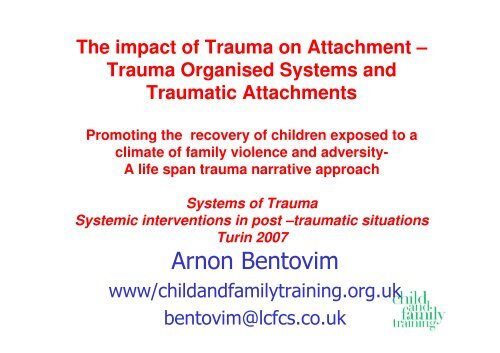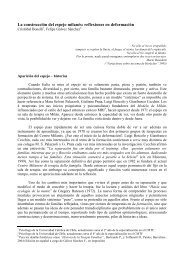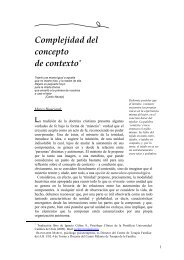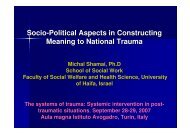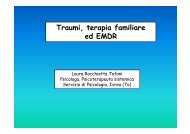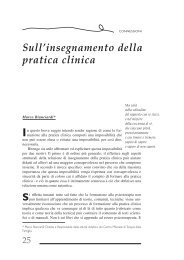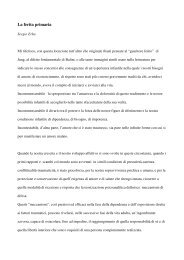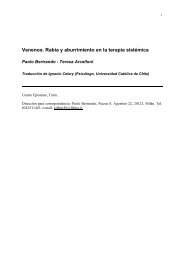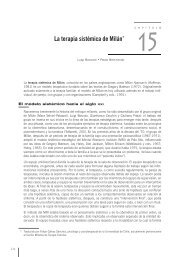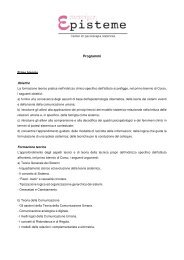Arnon Bentovim - Episteme
Arnon Bentovim - Episteme
Arnon Bentovim - Episteme
You also want an ePaper? Increase the reach of your titles
YUMPU automatically turns print PDFs into web optimized ePapers that Google loves.
The impact of Trauma on Attachment –<br />
Trauma Organised Systems and<br />
Traumatic Attachments<br />
Promoting the recovery of children exposed to a<br />
climate of family violence and adversity-<br />
A life span trauma narrative approach<br />
Systems of Trauma<br />
Systemic interventions in post –traumatic situations<br />
Turin 2007<br />
<strong>Arnon</strong> <strong>Bentovim</strong><br />
www/childandfamilytraining.org.uk<br />
bentovim@lcfcs.co.uk
Growing up in a climate of abuse and<br />
violence<br />
Sebastian Faulks - Engleby(2006)<br />
• ‘That child would slowly ascend towards full<br />
awareness in a world whose sky was violence and<br />
whose horizons were fear. And however resourceful<br />
he was, however patient and fortunate in the events<br />
of his life which followed, he was like a creature in a<br />
nest of imprisoning boxes who could never really<br />
break free’<br />
• ‘This was his world and any attempt to persuade him<br />
that it was merely a ‘subjective’ or ‘individual’<br />
experience would never convince him’
Goals for the presentation<br />
• 1 Current research on the impact of living in a<br />
climate of violence, abuse and neglect on children<br />
• 2. Approaches to assessing and intervening on the<br />
impact of these events on children young people and<br />
carers<br />
• 3. Approaches which are helpful to create a<br />
transformative narrative of traumatic and stressful<br />
events over the life-span of the child<br />
• 4. Approaches to promote recovery and growth<br />
• 5. Acknowledgements
U.S. Perspective of the Impact of Trauma on<br />
Development<br />
(Harris, Lieberman and Marans JCPP 2007)<br />
• ‘Each year exposure to violent trauma takes its<br />
toll on the development of children<br />
• Children are at increasing risk of school failure,<br />
anxiety, depression and PTSD; alcohol and drug<br />
abuse; the perpetration of the violence to which<br />
they were exposed<br />
• ‘Troubled children’ in education system, child<br />
protection, law enforcement, substance abuse,<br />
criminal justice<br />
• The root of their problem – exposure to violence<br />
and and abuse is unrecognised
NSPCC study on Prevalence of abusive<br />
experiences in childhood<br />
• Serious physical abuse and violence causing physical injury,<br />
7%<br />
• Serious absence of physical care carrying a high risk of<br />
injury 6%<br />
• Serious absence of supervision allowed to stay out<br />
overnight under 10, parents not knowing whereabouts under 14,<br />
5%<br />
• Serious emotional,control,domination,humiliation<br />
withdrawing affection 6%<br />
• Sexual abuse, all forms 12 and under 16%<br />
• Sexual abuse, contact abuse 11%
Poly-victimisation: A neglected<br />
component in child victimisation<br />
(Finlelhor, Ormrod and Turner 2007 CAN)<br />
• National representative sample of of children’s experiences<br />
of violence and the mental health consequences, 2- 17<br />
• Juvenile Violence Questionnaire, sexual victimisation,<br />
physical assault, property victimisation, maltreatment, peer/sib<br />
victimisation, witnessing<br />
• 22% experienced 4 different types of victimisation in<br />
previous year, high (7) 7%, lower (4-6) 15%<br />
• Adversity factors relevant, and co-occuring in rape,<br />
witnessing assault, dating violence<br />
• Higher the number of victim experiences the more<br />
extensive the mental health effects, and the less specific<br />
the effects
The impact of living in a climate of violence –<br />
the development of sexually abusive behaviour<br />
(BMJ. 317, 175-179 1998)<br />
SIGNIFICANT FACTORS<br />
• Experiencing<br />
intrafamilial violence<br />
• Witnessing family<br />
violence<br />
• Rejection by family<br />
• Discontinuity of care<br />
Recurrent acts of<br />
physical abuse<br />
Recurrent exposure to<br />
marital violence or sibling<br />
abuse<br />
Rejection by emotional<br />
abuse or neglect<br />
Marital breakdown, in care,<br />
Children’s home, foster care<br />
18.0<br />
8.1<br />
7.5<br />
7.2
Models to understand the family as a<br />
violence prone institution<br />
• Cumulative models the numbers of biological, family and<br />
environmental stressors rather than particular combination<br />
• Biosocial model –the interactional and cumulative effects of<br />
biological and environmental adversity<br />
• Eco-systemic models- looks at the way family and<br />
environmental stressors affect parenting and the impact on how<br />
children's needs are met<br />
• Trauma-organised systems organising the realities of<br />
relationships
Impact of traumatic experiences on brain<br />
development (Glaser)<br />
• Experience determines pattern of brain development,<br />
• Brain development mirrors experience<br />
• Effect of serious deprivation causes most harm by<br />
o early experiences incorporated into neural networks<br />
o The effects of stress on brain development<br />
• Established connections not erasable but new learning<br />
(synapses) possible<br />
• Patterns often enduring, children experience threat despite<br />
protection, hyper-vigilant, hyper-aroused dissociation is a<br />
form of flight<br />
• Secure attachment is protective of stress response
Impact of traumatic experiences on<br />
development – dynamic narratives<br />
• Attachment trauma life-span impact of cumulative adversity<br />
• failure of mentalisation –the loss of a capacity to symbolise mental<br />
states –understand one’s own and others thinking or feeling<br />
• Fails to distinguish between internal and external reality<br />
• Dissociated from reality- loss of memory – false self/reality<br />
formation<br />
• Traumatic bonding –disorganised attachments –clinging to abusive<br />
parents –<br />
• Identification with the abuser –the perspective of the malevolent<br />
other- an alien being in the self representation
Family Violence –Trauma Organised<br />
Systems<br />
Systemic narratives<br />
• Trauma-Organised Systems are action systems<br />
• The “victimiser” is overwhelmed by impulses to<br />
actions of a physically,sexually ,or emotionally<br />
abusive nature,which emerge from his<br />
experiences.They are felt to be”beyond control”<br />
• The cause is attributed to the “victim”who in<br />
line with individual,familial and cultural<br />
narratives, is construed as responsible for the<br />
victimisers feelings and intentions.<br />
• Potential protectors are neutralised,organised by<br />
a process of minimisation,deletion and denial
Growing up resilient in a climate of<br />
violence and abuse<br />
Child abuse and neglect volume 31, no3 march 2007<br />
edited by Cathy Widom<br />
• Stressful factors and effects accumulate in<br />
particular families<br />
• Consequences accumulate in strength over time<br />
• A sub-set of individuals are resilient in adolescence,<br />
young adulthood and into later life ‘turning points’ can<br />
occur<br />
• Bright and sociable evoke support from teachers<br />
and children, fosters positive adaptation, the child going<br />
from strength to strength<br />
• Modifying behaviours consequent to abuse launches<br />
positive trajectories.<br />
• Multisystemic interventions minimise family and<br />
neighbourhood stressors, foster children’s innate<br />
personal resources overcomes impact of adversity
Clinical contexts where exposure to a<br />
climate of violence is characteristic<br />
• Children of parents with mental health, marital<br />
violence and substance abuse<br />
• Looked after children in foster and residential care<br />
• Later adopted children and young people<br />
• Young people responsible for seriously offending<br />
behaviour, secure placements<br />
• Young people in in-patient care<br />
• Children and young people taking a caring role<br />
with parents with disability and mental health<br />
problems
Establishing a context of work<br />
• Role of parents, foster carers, adoptive parents,<br />
residential workers and therapists taking a<br />
collaborative role<br />
• Therapeutic elements include<br />
- Establishing a context of adequate care<br />
-Trauma focussed therapeutic approaches<br />
- Narrative approaches<br />
-Systemic solution focussed approaches<br />
-The creative use of approaches
Stages of Therapeutic Work in Constructing a<br />
transformative life-span trauma narrative<br />
• First stage –Providing protection and constructing a<br />
professional narrative<br />
• Second stage – engaging the child or young person<br />
in therapeutic work<br />
• Third stage – Finding a language to engage in<br />
exploring emotional responses associated with<br />
traumatic life events<br />
• Fourth stage – Creating a narrative account of<br />
traumatic life events<br />
• Fifth Stage - Promoting recovery and a future<br />
resilient life
First Stage –<br />
Providing protection and constructing a<br />
professional narrative and profile of<br />
harmful impacts
Assessment Framework<br />
A map of relevant data to be collected<br />
Identity<br />
Family & Social<br />
Relationships<br />
Social Presentation<br />
Selfcare Skills<br />
Education<br />
Emotional &<br />
Behavioural Development<br />
Health<br />
CHILD’S DEVELOPMENTAL NEEDS<br />
CHILD<br />
Safeguarding<br />
CHILD<br />
Safeguarding &<br />
promoting &<br />
promoting welfare<br />
welfare<br />
Basic Care<br />
PARENTING CAPACITY<br />
Ensuring Safety<br />
FAMILY & ENVIRONMENTAL FACTORS<br />
Emotional Warmth<br />
Stimulation<br />
Guidance &<br />
Boundaries<br />
Stability<br />
Housing<br />
Income<br />
Community<br />
Resources<br />
Family’s Social<br />
Integration<br />
Employment<br />
Wider Family<br />
Family History<br />
& Functioning
Harm to Healthy<br />
Development Neglect,<br />
Failure to Thrive<br />
Parental Difficulties & Harmful<br />
Impacts on Development<br />
Insecurity,<br />
accidental & non<br />
accidental<br />
injuries, physical<br />
& sexual abuse<br />
Difficulties<br />
in providing<br />
protection &<br />
security<br />
Difficulties in<br />
provision of care &<br />
attention to health<br />
needs<br />
Negative<br />
family &<br />
environmental<br />
factors<br />
Difficulties in<br />
providing<br />
stimulation &<br />
communication<br />
Harm to<br />
psychological &<br />
educational<br />
development<br />
potential<br />
Harm to<br />
emotional<br />
development<br />
& emotional<br />
functioning<br />
Difficulties in<br />
providing consistent<br />
emotional warmth<br />
and responsiveness<br />
Difficulties in<br />
providing guidance,<br />
boundaries &<br />
management of<br />
behaviour<br />
Difficulties in<br />
providing stable<br />
relationships<br />
Harm to Identity<br />
Formation &<br />
Capacity for<br />
making<br />
relationships<br />
<strong>Arnon</strong> <strong>Bentovim</strong><br />
Harm to capacity to<br />
develop collaborative<br />
& prosocial behaviour
Gary<br />
THE WARDS<br />
Moira<br />
Ian<br />
14yrs<br />
8yrs<br />
Laura<br />
Michael
WARD FAMILY - Family Assessment<br />
• Former period of satisfactory care. Moira’s previous violent<br />
partners, alcohol used as a coping strategy.<br />
• Ian’s family use violence as means of control<br />
• Ian and Laura forceful, conflictual, Moira and Michael<br />
tentative, overwhelmed<br />
• Michael withdrawn sad and needy, Laura supports Michael,<br />
Moira organised by Ian’s forceful adversarial views, feels<br />
conflicted by her commitment to Ian and the pull of the<br />
children, Laura asserts family values<br />
• Michaels needs not met, Moira drinking heavily, Laura absents<br />
herself, risk of violence between the couple and towards<br />
children<br />
• Secure attachments have been disrupted by Moira’s<br />
accommodation to Ian who demands self-sufficiency, is punitive<br />
and critical, triggering Moira’s drinking
infantile/pseudomature<br />
Insecure,<br />
disorganised or<br />
indiscriminate<br />
attachments,<br />
/controlling angry,<br />
dismissive<br />
responses<br />
Unresponsive,<br />
unreliable,<br />
fragmented care<br />
giving<br />
Inaprop.<br />
expectations<br />
dependence/<br />
independenc<br />
e<br />
Failure to<br />
provide<br />
security and<br />
protection<br />
from harm<br />
Failure to provide security<br />
and protection from harm<br />
inappropriate<br />
punitiveness or<br />
sexual,<br />
experiences<br />
Evidence of<br />
physical or sexual<br />
abuse, sexualised<br />
behaviour,<br />
frozen/arousal<br />
responses<br />
Evidence of harmful<br />
exposure<br />
exposure to risky<br />
individuals inside<br />
and outside the<br />
home<br />
Unsafe<br />
environment,<br />
physical hazards<br />
inside outside the<br />
home<br />
injuries,<br />
continuing<br />
unprotected<br />
risks<br />
<strong>Arnon</strong> <strong>Bentovim</strong>
Pervasive<br />
negative mood<br />
and self<br />
perception,<br />
affective<br />
disorders,<br />
aggressive<br />
oppositional<br />
responses<br />
Lack of emotional<br />
responsiveness, or<br />
regulation of<br />
emotional states<br />
frozen, arousal state,<br />
anger, fear, clinging<br />
avoidance<br />
negative<br />
emotional<br />
tone,<br />
exploits,<br />
disqualifies<br />
lack of<br />
support<br />
Failure to express or<br />
respond to feelings,<br />
critical, humiliating<br />
rejection. ignoring<br />
Failure to<br />
provide<br />
adequate<br />
emotional<br />
warmth and<br />
protection<br />
Traumatic losses<br />
and traumatic<br />
stressful events,<br />
Failure to provide adequate emotional<br />
warmth and responsiveness<br />
Failure of<br />
empathic,<br />
emotional<br />
understanding,<br />
parental emotional<br />
states, distorted<br />
perceptions<br />
mental health,<br />
relationship<br />
conflict, substance<br />
abuse<br />
Lack of empathy,<br />
unfeeling,<br />
aggressive,<br />
withdrawn,<br />
distancing,<br />
Persistent fear,<br />
distress, anxiety,<br />
anger,,<br />
regression,<br />
caretaking<br />
responses,<br />
organised by<br />
parental reality<br />
<strong>Arnon</strong> <strong>Bentovim</strong><br />
Persistent grief and<br />
unresolved traumatic<br />
symptoms,<br />
dissociated states,
Steps to determine risks of re-abuse, and<br />
prospects for rehabilitation (1)<br />
• Overall levels of harm<br />
• Level of protection parenting and therapeutic work<br />
required<br />
• Acknowledgement of harm, responsibility taken, and<br />
need for intervention<br />
• Acknowledgement of level of parenting difficulties<br />
• Motivation to achieve change<br />
• Potential to respond to child’s needs within time<br />
frame
Steps to determine risks of re-abuse and<br />
potential for rehabilitation<br />
• Influence of Individual and Relationship factors<br />
• Acknowledgement of role and potential for change<br />
within child’s time frame<br />
• Recognition of role of environmental factors and<br />
potential to change<br />
• Role of family professional relationships
Overall Process of work<br />
Initial intervention<br />
Therapeutic work in a context of protection<br />
Work with Perpetrators and Protective parents<br />
The use of different intervention approaches<br />
Rehabilitation phase of work
Developing<br />
secure<br />
attachments,<br />
confidence &<br />
freedom from<br />
harm<br />
Developing<br />
adequate<br />
emotional coping<br />
skills & resilience<br />
Providing<br />
responsive<br />
care, safety<br />
& protection<br />
Providing<br />
emotional warmth<br />
and responsiveness<br />
Developing<br />
healthily &<br />
good self care,<br />
thriving<br />
Provision of<br />
basic care &<br />
attention to<br />
health<br />
Positive family<br />
&<br />
environmental<br />
factors<br />
Providing adequate<br />
boundaries &<br />
managing behaviour<br />
Providing<br />
adequate<br />
stimulation &<br />
communication<br />
Providing stable<br />
& consistent<br />
family<br />
relationships<br />
Parental Strengths & Impacts<br />
on Child Development<br />
Developing<br />
skills &<br />
educational<br />
capacities &<br />
potential<br />
Developing a sense<br />
of identity, social &<br />
family relating<br />
<strong>Arnon</strong> <strong>Bentovim</strong><br />
Developing<br />
collaborative &<br />
prosocial behaviour
•1996 you were born<br />
•1998 2 years<br />
•1999 3 years old<br />
•2000 4 years old<br />
•2001 5 years old<br />
•2002 6 years old<br />
•2003/2004 7/8 years<br />
Charlotte’s Life- Experiences<br />
•You lived on an estate<br />
•Your brother was born<br />
•Your sister was born<br />
•Your Dad, Mum and your brother and sister<br />
moved around all over the country. Dad got<br />
violent to your uncle when you were staying<br />
with him. The police arrested him. Mum was<br />
scared and left, she was too scared of dad to<br />
take you, she had a handicap<br />
•Dad was arrested for being drunk, he<br />
argued with your aunt and left with you and<br />
your sibs, he had a lot of trouble with anger<br />
•You all moved to another house with dad’s<br />
friends who used drugs, You went on<br />
moving, living in pubs and homeless<br />
accommodation<br />
•Dad had a gun, dad was drinking a lot, you<br />
were filthy<br />
•You were living in a mess, not being fed or<br />
looked after, not going to school<br />
•After a lot of concerns by social workers<br />
you are taken into care, your dad is in prison<br />
for hitting someone badly
Charlotte’s Initial State, aged 8<br />
• Health-Poor growth, neglected appearance, persistent UTI<br />
• Education – Continuing restlessness ,aimless, boredom, poor<br />
basic skills, major gaps requires significant remedial help,<br />
• Emotion –Indiscriminate, insecure disorganised Phases of<br />
extreme emotional distress, pervasive negative mood,<br />
intolerance of frustration, anger, arousal and oppositional<br />
behaviour. No capacity to think about others ’<br />
• Post-traumatic nightmares, flash-backs, re-experiencing is<br />
less
Charlotte’s initial state<br />
• Identity-Has to be a compulsive carer, wants to clean, do<br />
housework. Feels close to her father, preoccupied with him, is<br />
angry she is not with him. Very poor sense of herself, rejects<br />
foster carer<br />
• Relationships-Has no capacity to confide in her foster-carers,<br />
longs to see her siblings, fighting and rivalrous with foster sibs,<br />
• Social relationships- squabbling and unable to make<br />
friendships<br />
• Self presentation Ashamed of her appearance ,felt dirty,<br />
compulsively washing<br />
• Self care Has lapses, forgets to wash, wets soils, infantile<br />
capacities
Second Stage<br />
Working with Children<br />
•Establishing the child’s life-line and<br />
experiences
Therapeutic Approaches<br />
•Establishing a working<br />
relationship and alliance –<br />
building up an attachment –<br />
individual, group and family<br />
contexts<br />
•Working with protective parents,<br />
carers of creating a ‘therapeutic<br />
team’ who witness both the<br />
impact of trauma and its<br />
overcoming<br />
•Awareness of attachment style<br />
•Fosters acceptance, collaborative<br />
consistent, reliable, safe, calm<br />
•Fosters cohesion, belonging and<br />
boundaries, clarify confused<br />
perceptions<br />
•Fosters sharing pleasure, pain,<br />
successes<br />
•Reframe, positively connote<br />
behaviour, and externalises<br />
problems –’ the spoiler’<br />
•Seek exceptions, solutions,<br />
survivor scripts
How do I tell my story?
Other methods used<br />
•Geno-gram<br />
•Psychotherapeutic board games<br />
•Video – in relation to Anger<br />
management<br />
•Building bricks – used as an analogy for<br />
‘coping strategies’<br />
•Video player – Buttons for Play, Pause,<br />
Re-edit, Stop and Eject (help Timothy<br />
to manage his flashbacks)
Pete’s Ecomap<br />
ECOMAP SECTION<br />
0 – 5 years<br />
Mrs<br />
McGavin<br />
Model<br />
Maker<br />
Ian<br />
Pat<br />
Mum<br />
Dad<br />
John<br />
Mrs<br />
Woodhall<br />
YOU<br />
Granddad<br />
Carl<br />
Auntie<br />
Lily<br />
Nan<br />
BO<br />
You are in the centre, there are 2 outer circles, an inner circle to put important people who<br />
are close to you, e.g. family members, and an outer circle to put in people who are not so<br />
close. You can join up the people to yourself with lines to show the bond.
Norman’s Life-Line
Similarities<br />
•Both of us are funny and like cars<br />
•We can both cook and we both swear<br />
Ways to describe Dad<br />
•Workaholic<br />
•Does illegal things<br />
Things I would like to be different:<br />
•That he had treated us nicely<br />
•Me still living with him<br />
•Him not doing illegal things<br />
•Him being there for me when things were<br />
bad<br />
Things I learned from Dad<br />
•How not to treat women<br />
•How to fix cars<br />
•Humour<br />
•Swearing<br />
How can he help me in future?<br />
•With money and bits I need
Similarities<br />
•Both get upset<br />
•Can both cook and draw<br />
•Like the same music and films<br />
Ways to describe Mum<br />
•Kind and caring<br />
•Calm and observant<br />
Things I would like to be different:<br />
•Her picking a decent boyfriend<br />
•Her having some confidence in herself<br />
•That she had stood up for me more when I<br />
was little<br />
Things I learned from Mum<br />
•How to cook<br />
•How to look after myself<br />
•That there are really bad people out there<br />
•Care for others<br />
How can she help me in future?<br />
•Being there if I need someone to talk to
Similarities<br />
•Both funny and a bit silly sometimes<br />
•Can like cars and playing in the park<br />
•Both like fashionable clothing<br />
Ways to describe James<br />
•Funny and friendly<br />
•Annoying and nagging<br />
•Co-operative<br />
Things I learned from & about James<br />
•That I should deal with my feelings better<br />
•That he didn’t like it (sexual abuse)<br />
•That abuse is not a way of getting back at<br />
people<br />
•That he wasn’t responsible<br />
How can I manage my relationship with him in<br />
future?<br />
•Have a meeting with him before I leave<br />
•Not be on my own with him<br />
•Tell people when I’m feeling risky<br />
•Walk away or play football when feeling<br />
annoyed with him
Third Stage –<br />
Exploring the emotional<br />
experiences associated with<br />
traumatic events
Third Stage<br />
Exploring the emotional experiences<br />
associated with traumatic events<br />
• This stage marks the process of exploring<br />
feelings and managing them<br />
• It is vital not to expose painful feelings<br />
without the tools to cope with such feelings,<br />
developing coping skills<br />
• Sharing with carers reinforces the key<br />
witnessing process which has been found to<br />
be the essential ingredient in trauma<br />
therapies
Why am I such a Mess?<br />
I want my mum to write to me – I want a<br />
happy family…. I feel abandoned!<br />
I feel my life is a big mess – I<br />
am in the middle of it and would<br />
like some answers!!!
In my Shoes<br />
The matrix: people, settings<br />
and emotions
The matrix: people, settings<br />
and emotions<br />
people<br />
emotions<br />
settings
Standard Scenes
Rachel’s Scenes<br />
Then the scenes are repeated with a<br />
male child, then with a female child.
Pete’s Emotions Palette
I’m always anxious<br />
coming out of cubicles<br />
when other men are<br />
there. I always get<br />
this feeling that they<br />
watching me.
Structure of the programme:<br />
Somatic experiences<br />
Somatic experiences module<br />
•Representation of pain and discomfort that has been<br />
experienced.<br />
•Pain can be represented by different shapes, sizes and an<br />
indicator of 'throb'.<br />
•A written account of an uncomfortable experience can be<br />
incorporated.
Stuart – unable to talk about domestic<br />
violence<br />
Stuart<br />
• Full care order<br />
• Moderate learning difficulties<br />
• Witnessed and experienced extensive violence in the<br />
home<br />
• Highly anxious<br />
• Soiling and enuresis<br />
• Victim of sexual abuse by older peer at school<br />
• Perpetrator of sexual abuse against younger siblings,<br />
young cousin and another child
Somatic experiences of Stuart 1
Somatic experiences of Stuart 2
Processing Difficult Experiences<br />
Vulnerable<br />
Angry<br />
Very unsafe<br />
Defence Left Fullback Centre Half Right Fullback<br />
Damaging<br />
things<br />
Absconding<br />
Energetic &<br />
Hyper<br />
`<br />
Just give up<br />
There’s noone<br />
to look<br />
after me<br />
I’m alone<br />
No-one cares<br />
L.Midfield Centre Midfield R. Midfield<br />
Secretive Being abusive Not talking or<br />
listening<br />
Centre Forward Strikers
Processing Feelings 2<br />
Contained<br />
Safe<br />
Defence Left Fullback Centre Half Right Fullback<br />
Family<br />
work<br />
I can trust<br />
people<br />
Talking about<br />
my feelings<br />
Adults taking<br />
charge in a<br />
positive way<br />
Midfields L. Midfield Centre Midfield R. Midfield<br />
Stick with<br />
it<br />
More<br />
confident<br />
Taking care<br />
of myself<br />
Stay on<br />
supervision<br />
Centre Forward Strikers<br />
It’s going<br />
to be OK<br />
Happy
Fourth Stage<br />
-Processing difficult experiences<br />
Creating a Narrative of Stressful<br />
and Traumatic events in your life
Creating the Trauma Narrative<br />
Defining the nature of the experience<br />
• We need to go slowly into what happened<br />
in as much detail as possible,.<br />
• use all the skills you've developed to<br />
write, draw and talk even about the most<br />
distressing<br />
• Put yourself back there in your mind, as<br />
if it’s happening, but you’re in control<br />
• We’ll see how you felt throughout, try to<br />
make sense of the way you felt,<br />
• Trauma is like an infection, if it’s left it<br />
can heal, but it can get worse – the bad stuff<br />
has to be let out –
Creating the Trauma Narrative<br />
Promoting recovery –first stages<br />
• To consider how you felt, what explanation did<br />
you give yourself and how do you explain it<br />
now<br />
• .<br />
• Arousal, cutting off, fight and flash-backs are<br />
strengths, but may not be necessary any longer,<br />
and need to be controlled<br />
• Use supportive family members to confirm what<br />
happened<br />
• , Ask questions, get help to confront those who<br />
hurt be prepared to answer questions from<br />
those who you may have hurt
Norman’s Life-Line<br />
• 10.09.91: Norman was born. Lived<br />
with Mum and Dad<br />
• Age 3yrs: Birthday party at<br />
McDonalds. Living in good<br />
neighbourhood.<br />
• Age 5yrs: Moved house and had<br />
first kiss.<br />
• Age 6yrs: First memory of watching<br />
mum and dad row. Went to my<br />
room<br />
5. Rowing more frequent<br />
• Happy<br />
• “Twas goood!”<br />
• “Pissed off! Left it<br />
• Sad & pissed off
• Age 6yrs: Brother Allan born<br />
• Age 6yrs: Dad left home. I<br />
saw him pack his bags and walk<br />
out. I asked mum what was<br />
happening and she told me. It<br />
was both their fault.<br />
• Changed school<br />
• Age 7-8yrs: David moved in<br />
(mum’s new boyfriend). Later<br />
moved house – nice area. Not<br />
much arguing<br />
• Very happy<br />
• Upset, annoyed, angry.<br />
• Bored but I was popular and had<br />
lots of friends<br />
• Happy
• Age 8yrs: Sister Lilly born<br />
• Arguing increased between Mum and<br />
boyfriend. Age 9-10yrs they split<br />
up and he moved out<br />
• Age 11yrs. We moved house and<br />
moved in with ‘an arsehole’ called<br />
Gerry and his daughter (9-10yrs).<br />
Shared a bedroom with Allan. Moved<br />
school. Had no friends.<br />
• Happiest day of my life<br />
• Annoyed, angry, upset<br />
• Felt crap. Couldn’t be asked.
•At this point Norman was finding it increasingly<br />
difficult to talk about his experiences. Instead<br />
he used the life line to communicate. I would ask<br />
him questions and he would write or draw the<br />
answers on the life line
• Age 11yrs: Moved in with<br />
Dad and Carrie (his wife),<br />
James (her son), Allan.<br />
• Age 13yrs: Sexually abused<br />
James<br />
• ANGRY! Because she thinks<br />
she can boss me about.
Fifth Stage<br />
Transforming the Trauma<br />
Narrative<br />
Promoting Recovery –later<br />
stages
Charlottes Trauma Narrative,<br />
the process of recovery and growth<br />
•Then<br />
•I was horrid to mum, we hit her,<br />
spat at her, threw food on the floor,<br />
dad would hit her if she didn’t<br />
make something different. She did<br />
what I told her<br />
•Mum argued with dad, she walked<br />
out on us, dad cared about us, she<br />
did’nt<br />
•We didn’t have to go to school, we<br />
played in the road, dad took us to<br />
loads of places we had a good time<br />
•Dad got into fights, he was at the<br />
pub, we were frightened, we had<br />
to clear up if he was sick, he was<br />
better than mum<br />
•Now<br />
•I'm not like my dad, I look like<br />
him, but I’m soft like mum really, I<br />
don’t have to hit people with bats,<br />
he’s scary, I cant trust him, he<br />
never says sorry, why not?<br />
•I wished I hadn’t been horrid to<br />
mum, it wasn’t right, I’d like to say<br />
sorry<br />
•I wished I went to school. I've<br />
missed out, I’m cross and sad<br />
•The nights were worst, really<br />
frightening, dad started trouble, we<br />
never knew what would happen.<br />
Dad said he’d kill mum if we went<br />
with her, she wanted us,he blamed<br />
her, he hit her all the time, it made<br />
us scared.
Changes noted in Charlotte<br />
1 The evidence for recovery and growth<br />
• She has been in foster care 2 years 8 – 10 years<br />
• Health- Gradual improvement in all areas of functioning,<br />
• Education – Continuing restlessness, boredom,major gaps no<br />
concept of time<br />
• Emotion –extreme emotional distress, anger, arousal and<br />
oppositional behaviour modifying.’<br />
• Miss ‘Temper’ is less in control, Mood is generally more positive<br />
• She is beginning to think about how other people feel, and how<br />
to treat them, mentalising<br />
• Not the punitive parent in therapy, experiences the terror<br />
and fear she was exposed to<br />
• Post-traumatic nightmares, flash-backs, re-experiencing is<br />
less
Changes noted in Charlotte<br />
2. The evidence for recovery and growth<br />
• Identity- Distancing herself from birth family, part of foster<br />
family –mum and dad- not the compulsive carer<br />
• She feels different – something clicked –not now traumatically<br />
bonded to father<br />
• Relationships- Increasing confiding in Foster mother, has<br />
written letters to parents<br />
• Social relationships- still squabbling and losing friends<br />
• Self presentation proud of her hair and appearance, was<br />
ashamed felt dirty, compulsively washing<br />
• Self care –has lapses, forgets to wash
Old me – New me
OLD ME<br />
Smoking<br />
Swearing a lot<br />
Hanging around in gangs<br />
Sexually abusive<br />
Angry<br />
Confused<br />
Scared<br />
Unwanted<br />
NEW ME<br />
Happy relationship<br />
Children<br />
Houses<br />
Cars<br />
Working as football coach<br />
or mechanic<br />
Earning loads of money<br />
Cheerful & happy<br />
Polite<br />
Not being abusive<br />
05/06/06<br />
Angry, scared,<br />
Annoyed, confused.<br />
A bit happy and<br />
Cheerful. Good<br />
Sense of humour<br />
06/08/07<br />
About to leave<br />
SWAAY
Creating a survivor script with Pete: 1<br />
• Pete was fixated on needing<br />
his father to be in prison before<br />
he could move on. This had to<br />
be symbolic of putting him<br />
‘behind bars’.<br />
• We also worked with Pete to<br />
accumulate evidence of when<br />
his positive self had managed to<br />
come though since been at<br />
SWAAY.
Pete’s positive thinking cycle<br />
I can make<br />
and maintain<br />
Healthy<br />
relationships<br />
I am a<br />
Good<br />
person<br />
I am not my<br />
father<br />
I can change<br />
I do not need<br />
To control<br />
others<br />
I can manage<br />
my feelings<br />
I can make<br />
the<br />
Right<br />
choices<br />
I am responsible<br />
For my choices
Creating a survivor script with Pete:<br />
Focusing on the positive present.<br />
What is the most positive you’ve felt in the<br />
last week on a scale from 0-10?<br />
9<br />
What made you feel like that?<br />
Getting a placement at college<br />
How did you feel within yourself?<br />
Speechless
Creating a survivor script with Pete:<br />
Future Life Line<br />
• Next 6months:; start college, see brother, make<br />
friends, and possibly girlfriend.<br />
• 6months-1yr: get on with people, learn how to<br />
handle different types of animals.<br />
• 1Yr: job as pet shop assistant, achieve certificate.<br />
• 1yr 6 months: job, and phone.<br />
• 2yrs: Achieve diploma.<br />
• 5yrs: get a degree, live with mum for a couple of<br />
years, have a girlfriend lots of friends, be able to<br />
drive.
My story as a Survivor and Creating a Good Life<br />
Timothy<br />
I am 14 years old. I have got 4 half siblings, 1 brother<br />
I first was abused when I was 2 years by my Step-dad touching, oral and anal sex. He<br />
forced me to have sex with Brian’s bottom and Tracey’s vagina.<br />
No-one believed me except for my dad and his girlfriend. the police said I was too young to<br />
know .I went into care because of my abusive sexual behaviour towards girls at school.<br />
I went into 2 foster care homes, I was setting fire and having sex with the girls. I went<br />
back to dad’ I was always fighting and getting in trouble with the police.<br />
I stayed for 3 years in foster care I was too bad for them to<br />
handle me. I showed my penis to their granddaughter,. I came to SWAAY.<br />
I was smoking, absconding and getting into fights. I touched 2 boys here.<br />
my Independent Visitor, was sexually abusing me, touching and giving oral sex to him,<br />
I could not talk. I was scared, worried, frustrated And threatened. I was acting my<br />
feelings out<br />
to make adults realise. I finally spoke out I did not want to be a victim any more.
My story as a Survivor and Creating a Good Life<br />
I am Timothy, I am 14 years old and a SURVIVOR<br />
When I was 2 years old I was abused by William.<br />
I was just a child, which makes William responsible for the abuse.<br />
I didn’t know the difference between right and wrong, I thought it was all just a game<br />
William forced me to abuse Brian and Tracey. I am feeling annoyed, frustrated and<br />
confused.<br />
William took my childhood away from me..<br />
I know now what I did to Brian and Tracey was abuse and that it was WRONG.<br />
I have gone into therapy and talked about it. I am doing group work and individual work.<br />
I am doing all of these things to help me be a better man.<br />
I have abused other children. I also know that it was wrong: Because it was under aged.<br />
Because Both parties didn’t agree. Because it was abuse.<br />
My Independent Visitor abused me when I was 14. He was responsible because he is the<br />
ADULT.<br />
I found it hard to speak out because I was scared.<br />
He abused the right to be my Independent Visitor.<br />
I was acting out my feelings. The adults didn’t notice, which left me feeling let down<br />
until I spoke out and not wanting to be a victim any more. I have worked hard by<br />
talking and trying to build my relationships back up with some adults.<br />
I AM A SURVIVOR. MY LIFE IS GOING TO BE DIFFERENT BECAUSE I AM NOT<br />
GOING TO BE<br />
A VICTIM OR AN ABUSER ANY MORE. I WANT A GOOD FUTURE WITH A FAMILY<br />
OF MY OWN.<br />
I WOULD LIKE TO PLAY FOOTBALL OR RUN MY OWN GARAGE.


